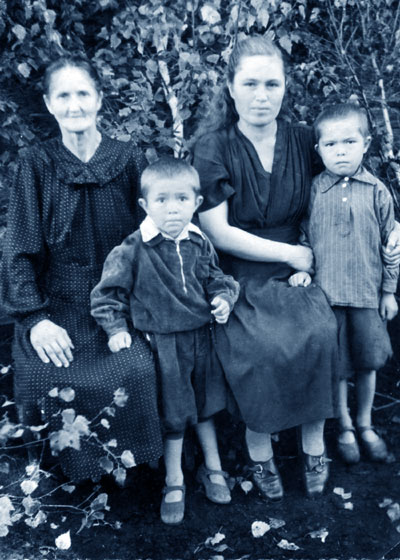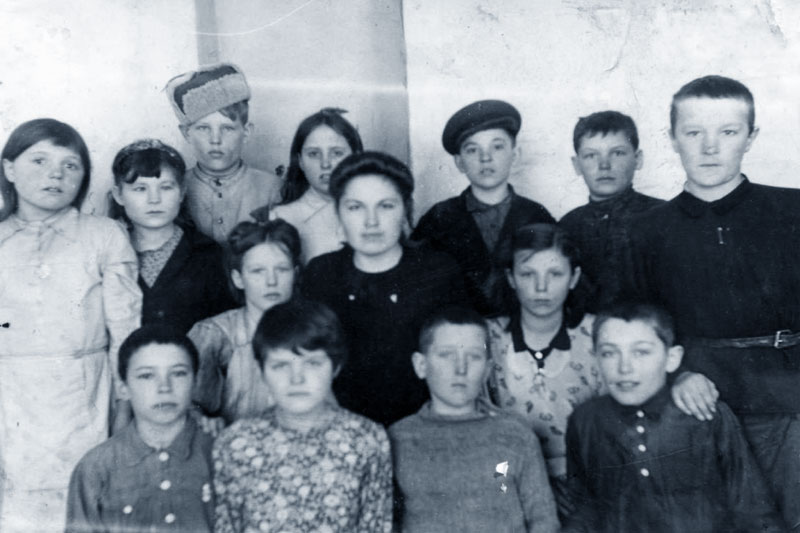









Leontina Schuckert was born in the hamlet of Wiesenmiller, Saratov region, district of Seelmann, Republic of the Volga Germans on the 24th April 1923; her parents lived simply. Her father, Alexander Yakovlevich, worked on a dairy farm, mother Emma Georgiev took care of the household. By 1930 three children had already been born to the family. Roman saw the light of day in 1927, Amalia in 1930. However, the famine year 1930 carried off the youngest daughter, while the head of the family came down with tuberculosis and died in 1936. That was the end of Leontina’s childhood, for from now on she had to work with her friends and classmates in a little orchard behind the village; and in the little river called Jeruslan, feeder river of the Volga, they used to bath and swim and catch fish.
In spite of all distress and concern that had befallen the family twice, Leontina did well at school and, after the seventh term, began to attend the technical college of pedagogics in Seelmann. In May 1941 she received a document proving her professional qualification – teacher for basic primary schools. However, her joy about the school leaving certificate did not continue for long. Like all German families living on the river Volga she faced deportation. They were not allowed to along more belongings than any of them was able to carry himself.

Emma Georgievna Stukkert, daughter Leontina and grandchildren Yevgeniy
and Valeriy. Hamlet of Grusenka, Balakhtinsk District, 1954
After a long torturous trip the family got to the village of Kozhany in Balakhtinsk District. In this place they had to experience the first war winter. In spring they were deported to the Far North. More than one month they spent on the river Yenissey, on the open deck of a ship, where they could find shelter only by covering themselves with the few belongings they had taken along. They happened to get almost all the way up to Dickson. Here, at the landing stage of Innokentiy, right in the tundra with its perm frost and long polar nights, the Stukkert family is forced to spend six never-ending years. The live in an unheated barrack. When there was no snow storm, they could see the stars through the openings in the ceiling. During the first winter one of the exiles died. It was impossible to dig out a grave in the frozen ground, for such a hard work was far beyond anybody’s strength. Hence, the deceased, covered with straw mats, was kept under a protecting roof throughout the whole winter. To the end of winter Emma Georgievna grew ill with scurvy and lost all her teeth. She was only forty years old at that time.
Leontina and Roman were working hard through all those years. And what kind of labor they had to do! They caught fish, mended fishing nets, went hunting, and during the summer berried in the tundra. They received a modest food ration and lived on that. After the war had ended, the exiles were permitted to leave the Far North. Leontina returned to Balakhtinsk District with her mother and brother, where lots of deported Germans were living. The district administration of education sent Leontina to the Gruzensk school to work there as a teacher of basic education. All the family lived in a little wooden house, just beside the village store. Roman found himself a job in the shop – as a worker and watchman. During the day he went to the forest by oxcart to provide firewood, which he would then saw up, chop and finally heat the store with. At night-time he worked as a night watchman. They were suffering such a hunger that they always recalled the times when they had been living in the Far North: there they had at least received a regular ration. They exchanged their clothes for food. It would happen that people, enfeebled by hunger, lost conscience. An old woman from among the long-time residents noticed that the young teacher often paused to wait, until the next dizzy spell was over. She invited her to her home, gave her a little milk to drink and asked her to come by every day. In summer berries would save them, and whenever they went to berry, they were out for a whole day. The berries were then exchanged for other food. In the summer of 1947, after having spent three years at the front and two more years of military service, Nikolai Stepanovich Kozarez returned to his home village. Later he married Leontina Stukkert. In 1948 son Valeriy was born to the young couple, two years after son Yevgeniy. The young mother adored her children , tried to pamper them as much as she could. It never happened that she returned with empty hands from a trip to the district town; she always brought along little gifts for her children. But their happiness did not last for long. In the autumn of 1950 brother Roman was sentenced to 2 years – based on a made-up accusation. During his stay in camp he was sentenced once again for having given some imprudent comment. This time he was sentenced to 10 years. Time was passing by. Work at school, familial trials and tribulations; the children grew up. In 1956 they bought a house of their own. In the same year Roman returned home from the place of his detention. Later he will get fully rehabilitated.
Leontina dedicated a lot of time to her job, used to sit in the light of a kerosene lamp until late night, working on time tables and rectifying exercise books. As from the middle of the 1950s she taught the children of Gruzensk school German. Give lessons in German language in post-war years was quite difficult for comprehensible reasons. Her students, today all adults themselves, like to recall her interesting lessons until today. Parents and children appreciated her for her goodness and honest character. In spite of her youth they called her Alexandrovna and often asked her for advice. Leontina spent much time with the children; they prepared lessons together, sewed clothes for the New Years‘ festivities, did handicrafts to decorate the Christmas tree. In the evening the parents used to read out from books, which was the general favorite occupation on long winter evenings. Mum often told them about the Far North, as well as about her native village. Towards spring all windowsills were blocked up with little pots formed from newspapers, in which they tried to grow seedlings. Mother was a very sedulous woman: in the summer she worked in her orchard; the used to go there on foot. Mum learned to cut grass by means of a scythe. She and father mowed hay and took care of the hay harvest. They harvested enough to keep a cow. Grandma Emma was a great help. Even after her return from the Far North Leontina did not get separated from her mother.
Early in the 1960s the Volga Germans were permitted to return to their native places. At that time Roman was already married, and he decided to go back to his home village. Sometime later he sent a letter, in which he informed them that he had hardly recognized his former place of home and that he sincerely discouraged them to come there, as well. One year later he returned, trained as a driver at Nazarovsk driving school and later worked in Balakhta.

Students of the Grusensk 7-term-school with their German teacher
Leontina Alexandrovna Kozarez (Stukkert). Early in the 1950s..
Leontina Alexandrovna Kozarez was working for the Gruszensk school for more than 30 years, always giving a paradigm for her loyalty to one and the same place and one and the same matter. In 1979 she decided to leave Gruzenka, as it did not open up any further perspectives at all and the 8-term-school got reorganized into a primary school. Having removed to her elder son to the hamlet of Kalinino, Pervomaisk District, Republic of Krim, she lived there for 23 years, died there in 2002 and was also buried in this place.
Jevgeniy Nikolaevich Kozarez,
Hamlet of Gruzenka, Balakhtinsk District, 2010